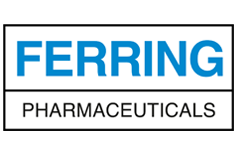Ferring and Conaris complete license agreement for new recombinant molecule in gastroenterology
Saint-Prex, Switzerland and Kiel, Germany – 10 December 2008 –
Ferring Pharmaceuticals and Conaris Research Institute AG today announced that they have completed an exclusive worldwide license agreement for the development of FE301 a new recombinant protein inhibitor of the IL-6 pathway for inflammatory conditions such as IBD and rheumatoid arthritis.
IL-6 acts early in the inflammatory cascade and, therefore, it is hoped that FE301 could offer physicians more options than current biologic treatments for Crohn’s disease and ulcerative colitis. This agreement represents another step in Ferring’s move into biotech research and development.
“Gastroenterology is one of the three key therapeutic areas on which Ferring focuses and we believe that FE301 represents the next generation of anti-inflammatory agents in this field”, said Dr Pascal Danglas, Ferring’s Executive Vice President of Clinical and Product Development. “We are also delighted to have this opportunity to work with Prof Schreiber, who is head of the Scientific Board of Conaris and such a renowned expert in the area.”
“We have high hopes for this new biologic therapy in the treatment of IBD”, commented Prof. Stefan Schreiber, Gastroenterologist and Institute Director at University Hospital Schleswig Holstein. “It is very pleasing, therefore, to secure this development programme with Ferring – one of the leading companies in the field – to bring this important new therapeutic principle to patients with chronic inflammatory diseases.”
“We are confident that FE301 has great potential, if successful in pre-clinical and clinical studies, to compete with all biological drugs which are currently on the market”, adds Dr. Dirk Seegert, Chief Executive Officer of Conaris.
Jost de Jager, Science Secretary of State of the Ministry of Science, Economic Affairs and Transport of Schleswig-Holstein commented, “This is a big achievement for our Excellence Cluster of Inflammation. Conaris’ success is a good example of the effective interaction between academic and commercial institutions and underlines Schleswig-Holstein’s leading position in this scientific and medical field.”
FE 301 is undergoing pre-clinical testing prior to moving in to Phase I in 2010.
– Ends –
Inflammatory Bowel Disease (IBD)
IBD describes a range of chronic diseases of the gastrointestinal system, encompassing Ulcerative Colitis (UC) and Crohn’s Disease (CD). IBD is characterised by intermittent flares with debilitating symptoms (such as diarrhoea, abdominal pain and weight loss) that can result both in a significant worsening of the patient’s quality of life as well as causing emotional distress and social isolation. In addition, patients can also suffer from a number of serious complications of the disease and may require life-long treatment and often surgery.
IBD is mainly a condition of the industrialised world. It affects men and women equally and all races, although it is more common in some races than others. In Northern Europe and the USA, the number of people affected by UC is approximately 120-270 per 100,000 – that is 1 in every 370-830 people1,2,3 – with between 3-25 new cases per 100,000 people diagnosed each year.
For CD, the number of people affected is approximately the same, with 145 per 100,000 affected, and between 6-8 new cases per 100,000 people diagnosed each year.1,2,3 However, unlike UC, the number of new cases of CD each year is increasing, particularly in young people, although the reasons for this are unclear.4 Both UC and CD show strongly rising incidences in the developing Asian countries including China.
In 2007 IBD sales were $2.65 billion in the seven major markets (Japan, US, and EU5). Crohn’s Disease represented 57% of this market with sales of $1.51 billion.5
About Conaris
Conaris, a biotech company based in Kiel, Northern Germany, is specialized in the discovery and optimization of innovative anti-inflammatory drug candidates and their transfer into early clinical development stages. Beside own research projects, Conaris always entertains several academic collaborations to amend its product pipeline. For further information, please visit www.conaris.de.
About Ferring Pharmaceuticals
Ferring is a Swiss-based, research driven, speciality biopharmaceutical group active in global markets. The company identifies, develops and markets innovative products in the areas of gastroenterology, urology and fertility. In recent years Ferring has expanded beyond its traditional European base and now has offices in 45 countries. To learn more about Ferring or our products please visit www.ferring.com.
For more information, please contact
Michael George of Ferring Pharmaceuticals on +41 58 301 0053.
References
-
- Rubin GP et al. Aliment Pharmacol Ther 2000; 14(12): 1553-1559.
- Farrokhayr F et al. Scand J Gastroenterol. 2001; 36(1): 2-15.
- Satsangi J and Sutherland L (2003) In: Inflammatory Bowel Disease, Churchill Livingstone.
- Loftus EV et al. Gastroenterology 1998; 114: 1161-1168.
- Commercial Insight: Inflammatory Bowel Disease, (DMHC2433) Datamonitor, February 2008.

